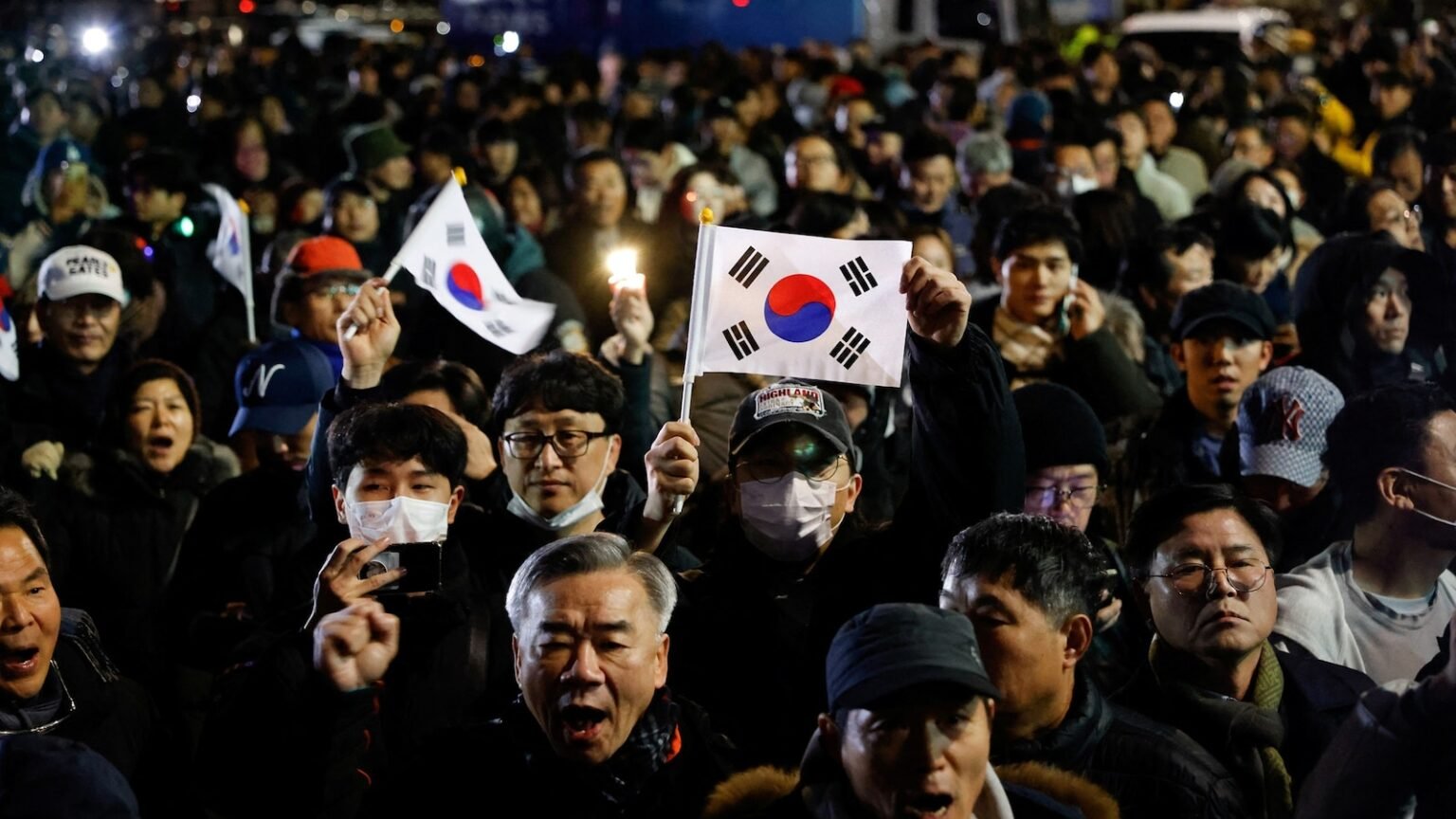After being caught by surprise by South Korean President Yoon Suk Yeol the decision to declare martial law on TuesdayThe Biden administration refused to condemn the move as it struggled to explain the rare but dramatic episode of political turmoil in a close US ally.
White House, Pentagon and State Department officials said Tuesday that they were in close contact with their South Korean counterparts, and that they were trying. assess the situation. President Joe Biden, who is currently traveling in Angola, said he was “just reporting” the developments after concluding an address.

In this Aug. 18, 2023, file photo, President Joe Biden, right, and South Korean President Yoon Suk Yeol shake hands during a press conference during the trilateral summit in Camp David, Maryland.
Ting Shen/Bloomberg via Getty Images, FILE
Earlier Tuesday, Deputy Secretary of State Kurt Campbell said the administration was watching developments in South Korea with “grave concern.” But Campbell and other officials across Washington also emphasized what they called an “ironclad” partnership between the United States and South Korea.
Despite the close alliance, the White House and State Department said they had not notified the US in advance of Yoon’s intention to impose martial law. US officials did not publicly denounce Yoon’s decision, but did not accept his allegations that South Korea’s opposition party engaged in “anti-state” activities with North Korea — Yoon’s stated reason for temporarily suspending civilian rule.

People gather outside the National Assembly after South Korean President Yoon Suk Yeol declared martial law on December 4, 2024 in Seoul, South Korea.
Soo-hyeon Kim/Reuters
“This is an incredibly delicate situation. I’m not going to make any conclusions at this time,” State Department Deputy Spokesman Vedant Patel. he said on Tuesday. “All hopes and expectations are that political disputes will be resolved peacefully and under the rule of law.”
That resolution seemed to be coming into focus just hours after Yoon’s declaration. In a dramatic scene, South Korean lawmakers made their way through throngs of protesters and military vehicles to gather at the National Assembly building at midnight, where members of the body voted unanimously to end martial law.
Soon after, Yoon complied with the decision by lifting his martial law declaration and saying that the troops deployed to enforce the order had already withdrawn.
“We are relieved that President Yoon has reversed course on the declaration of martial law and respected the ROK National Assembly’s vote to end it. Democracy is at the core of the US-ROK alliance, and we will continue to monitor the situation,” a. A spokesperson for the US National Security Council told ABC News in a statement.
“This is a bullet that was dodged,” said retired U.S the army Rear Adm. Mark Montgomery. “I think the US government probably expected what happened and kept quiet to see what happened.”
Montgomery, now CEO of the Foundation for Defense of Democracies, said the apparent outcome in South Korea — democratic process triumphing over authoritarian instincts — is far from guaranteed.
“I consider South Korea to be a pointed democracy. There is constant pressure from North Korea, constant pressure from China, and now you have Russia giving things to North Korea,” he said. “Like Taiwan, like Ukraine, like Israel, they are beleaguered democracies on the front line against this access.”
Still, the uproar raises new frustrations for the Biden administration and its legacy of promoting democracy abroad, as well as its strategy of containing China while strengthening other regional partnerships.

In this April 26, 2023, file photo, President Joe Biden and President Yoon Suk Yeol of the Republic of Korea shake hands during a meeting in the Oval Office of the White House in Washington.
Demetrius Freeman/The Washington Post via Getty Images, FILE
South Korea has been an ally during Biden’s tenure. The president honored Yoon with a state visit in April and chose the country to host the Democracy Summit, an annual convention created by Biden to promote democratic values.
The US military also has a large footprint in South Korea, with nearly 30,000 troops stationed in the country. In its first security alert since Yoon led to the imposition of martial law, the US embassy in Seoul warned Americans in the country that the “situation remains fluid” despite Yoon’s announcement that the order has been lifted.
The US has also been committed to helping South Korea defend itself since the two countries signed a mutual defense treaty in 1953 at the end of the Korean War.
Even as South Korea looks to turn the page from its brush with martial law, Montgomery said its alliance with the US will still face some uncertainty as Yoon faces a growing backlash.
“Yoon crossed the Rubicon,” he said. “His political life is in doubt.”
ABC News’ Molly Nagle contributed to this report.

